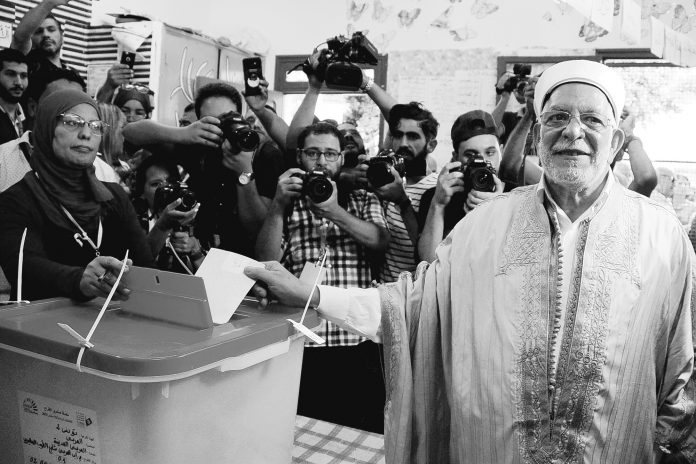
A jailed media magnate and an independent outsider appeared likely to face off in Tunisia’s presidential runoff, after a roller coaster first-round race in the country that unleashed the Arab Spring pro-democracy uprisings.
Official preliminary results are expected in the next couple of days from Sunday’s voting, in which corruption, unemployment and Islamic extremism were among key campaign issues. A second-round vote is expected by Oct. 13, the electoral commission chief said.
An exit poll by agency Sigma Conseil forecast what would be a surprising result: A top showing of 19.5% for independent Rais Saied, a constitutional law professor without a party.
Tycoon Nabil Karoui, jailed since last month on money laundering and tax evasion charges, was predicted to come in second with 15.5%, according to the poll.
Karoui’s supporters quickly declared victory, and his wife Salwa said his legal team is pushing for his release as soon as Monday. She read a letter he wrote from jail in which he said the apparent results reflected “the Tunisian people’s wish to see change, to say no to injustice, no to poverty, no to marginalization and yes to a fair state.”
The polling agency projected the candidate of moderate Islamist party Ennahdha, Abdelfattah Mourou, would come in third, followed by Defense Minister Abdeldrim Zbidi and then Prime Minister Youssef Chahed, who had been considered a top contender.
Sigma Conseil said it questioned 38,900 people at 778 of Tunisia’s 4,554 polling stations, spread out over 27 of the country’s 33 regions. It claimed the poll had a margin of error of 1%.
The electoral commission announced that overall turnout was a relatively low 45%. If no candidate wins more than 50% of Sunday’s vote, the election goes to a second round. The exact date of the runoff will be announced once the final first-round results are declared.
Both Saied and Karoui promised to fight unemployment, a key problem in Tunisia that also helped drive its 2011 revolution.
Saied has no political background but notably picked up support among young voters with his straightforward, anti-system image and constitutional law background. Corruption frustrates many voters, which might have increased the appeal of an outsider candidate.
Karoui meanwhile positioned himself as the candidate of the poor, notably using his TV network to raise money for charity. His arrest appears to have mobilized voters in the struggling provinces or those who feel sidelined in the Tunisian economy. Karoui was allowed to remain in the race because he has not been convicted.
The voting followed a noisy but brief campaign — 12 days — marked by backbiting and charges of corruption among the contenders. All vowed to boost the country’s flagging economy and protect it from further deadly attacks by Islamist extremists.
Tunisia is in many ways an exception in the Arab world, with its budding democracy lurching forward despite challenges. Some 6,000 Tunisian and international observers, including from the European Union and the United States, monitored the vote.
More than 100,000 security forces were on guard Sunday as 7 million registered voters were called to the polls. Military surveillance was especially tight in border regions near Algeria and Libya where Islamist extremists are active.
Sunday’s election follows the death in office in July of the nation’s first democratically elected leader, Beji Caid Essebsi. His widow, Chadlia Saida Farhat, died Sunday at age 83, as Tunisians were voting.
This is only the second democratic presidential election that Tunisia has seen since the 2011 popular uprising brought down autocrat Zine El Abidine Ben Ali and triggered uprisings across the Arab world.
“The most important thing is that the vote be transparent … and reflect the choice of voters,” said retired journalist Radhia Ziadi, alluding to the days when Ben Ali won election after election with well over 90% of the votes.
Tunis voter Sonia Juini summed up the overall sentiment as she cast her ballot, expressing hope the new president would make Tunisia more secure and “improve living conditions and take care of marginalized areas.”
Tunisia is also holding its parliamentary election on Oct. 6, another challenge since the new president’s success will depend on having support in parliament.q



















